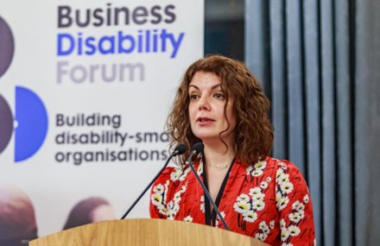Charities need to live our values and demonstrate what we are campaigning for when it comes to disability in the workplace, says Diane Lightfoot, chief executive of the Business Disability Forum.
Say the words ‘Disability Confident’ or ‘disability-smart’ to many diversity leaders and the conversation will tend to focus on large blue-chip organisations and government departments, not charities or not-for-profits. This is a shame, because the third sector is not the poor relation of its two bigger siblings but a significant employer in its own right. As the leader of a third sector organisation myself I believe the sector can, and should, be leading the way.
There can be a misconception that a successful diversity and inclusion programme is solely about resources. And while time and money can of course be factors, we know from our own research that most factors affecting whether disabled people join, and stay, at an organisation are far more fundamental. As Peter Drucker so succinctly put it: “culture eats strategy for breakfast” – and time and time again we see that visible senior leadership that raises the profile of disability in the workplace, confident and empowered line managers and clear policies to provide practical support are what really makes the difference.
This isn’t to say of course that a lack of resources presents no difficulties at all and that charities don’t face different challenges in comparison to other sectors. Firstly, they tend to be smaller, with one study in North-West England finding an average of 12 full-time-equivalent employees for each third-sector organisation in the area.
Diversity rarely a full time day job
This means that diversity and inclusion may rarely be a full time ‘day job’ for an employee but rather an add-on to an already busy workload. When Business Disability Forum ran a study of recruitment and retention in the business world in 2015 and 2016, we found that third sector organisations are less likely to have dedicated disability leads, limiting capacity for large-scale strategies or campaigns.
The money factor also becomes a bigger problem in the broader context of limited resources; 90 per cent of third sector organisations have an income of less £500,000 according to a study by Grayling , and in the North-East a quarter used reserves to meet running costs in 2016. Such immediate pressures can take the focus away from longer-term work to adjust hiring and working practices that affect whether disabled people can enter and stay in employment; it is more difficult for busy managers to pause and think differently when recruiting a new member of staff, for example.
But there is room for optimism. The areas where third sector employers really excel don’t involve money or resources at all. Our research found that more third sector employees (43 per cent) had disabled role models , - who are often critical factors in breaking through any stigma about disability at work - in their workplace than in any other sector. By way of contrast, only 25 per cent of private sector employees and 20 per cent of public sector employees could say the same.
'A disabled role model costs nothing'
A disabled role model, needless to say, costs nothing. All an employer needs is a space where open conversations can happen about disability, and where employees can step forward to share their stories and help each other. One in five of us will experience a disability at some point in our working lives – that means at least two for every average-sized charity in the North-West – and so creating a culture where all of us can bring our “whole selves” to work is vital.
Likewise we know from the same study that charities and not-for-profits tend to take a stronger line on bullying. 85 per cent of third sector companies have specific policies stipulate that disability-related bullying is unacceptable, compared to 80 per cent of the private and 75 per cent of the public sector.
The picture is less positive around work-health related policies; only 69 per cent of voluntary organisations have these, compared to virtually all of private and public sector employers. Similarly, the third sector needs to remove any ambiguity about adjustments – at the moment, 29 per cent of third sector employees are unsure whether there are written adjustment agreements in place, leaving them potentially vulnerable and – more importantly – missing out on the benefits of a workforce that is functioning at the most productive possible level.
The third sector is already ahead of its peers in quite a few areas in terms of inclusion. It’s time for it to build on this advantage and really act as an exemplar; if we are to campaign for change as third sector leaders, we need to live our values and demonstrate what we are campaigning for.
Diane Lightfoot is chief executive officer of the Business Disability Forum
Related articles












